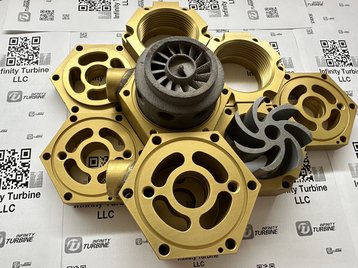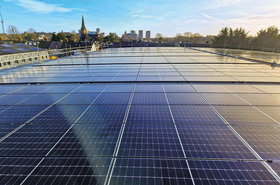Power technology company Infinity Turbine has launched a new heat reuse system for AI data centers which it says can harness the warmth created by servers to produce clean electricity.
The Cluster Mesh Power Generation System can help data center operators reduce the need for cooling water and power, the company claims.
Infinity Turbine can reuse AI data center waste heat
Infinity Turbine’s system utilizes small, modular Organic Rankine Cycle turbines connected in a mesh configuration, which the company says is similar to the way Tesla’s MegaPack storage battery operators work. This multi-cell-to-system concept apparently enables scalability, redundancy, and high efficiency.
Each turbine generator in the system requires 100,000 BTU of heat to produce up to 5kW of power. With 600 turbine generators operating simultaneously as a cluster, the system effectively utilizes 60,000,000 BTU of heat per hour, the company claims. This heat sink capability could reduce the cooling load on data centers.
When linked together, the turbines are capable of generating 3000 kWh of power per hour, Infinity Mesh said.
The company, which is based in Madison, Wisconsin, is also making some big claims about the amount of water the system can save data centers. By removing 60,000,000 BTU of heat per hour, less cooling water is required, and this could apparently be as much as 2.5 million liters per day.
It is not clear whether the Cluster Mesh Power Generation System has been deployed in any data centers yet.
Flex and Musashi launch energy storage solution for data centers
Meanwhile, supercapacitor specialist Musashi Energy Solutions has teamed up with manufacturing firm Flex to develop an energy storage solution aimed at AI data centers.
The Capacitor-based Energy Storage Systems (CESS) has been designed and manufactured by Flex and features Musashi’s Hybrid SuperCapacitor (HSC) technology.
CESS is an emerging technology designed to balance peak power on networks, protect the grid from intense surges, and efficiently manage energy. Musashi says its HSC is safer than battery storage systems, and offers a significantly longer lifespan and a wider operating temperature range.
“We are proud to lead the charge in powering the next generation of AI innovation alongside Flex to address the power challenges needed to unleash capacity for explosive data center growth,” said Frank DeLattre, president of Musashi Energy Solutions in North America. “Our partnership with Flex for its new CESS product will bring reliable, efficient, and scalable power solutions to the market.
“Musashi Energy Solutions continues to invest heavily in future Hybrid SuperCapacitor cell development to meet the future power density demands in AI computing as well as the manufacturing capacity required for customers to meet the forecasted cell volume.”
Flex will start production of the CESS system in the first half of 2025, and hopes to start shipping it to customers later in the year.
“Our collaboration with Musashi is central to developing our innovative CESS solutions to sustainably support the complex power demands of AI data centers worldwide,” said Mattias Jansson, vice president of power solutions at Flex. “Together with Musashi, our technology and innovation portfolio plans enable Flex to provide hyperscale operators with advanced energy storage systems that enable them to address long-term energy transitions.”




